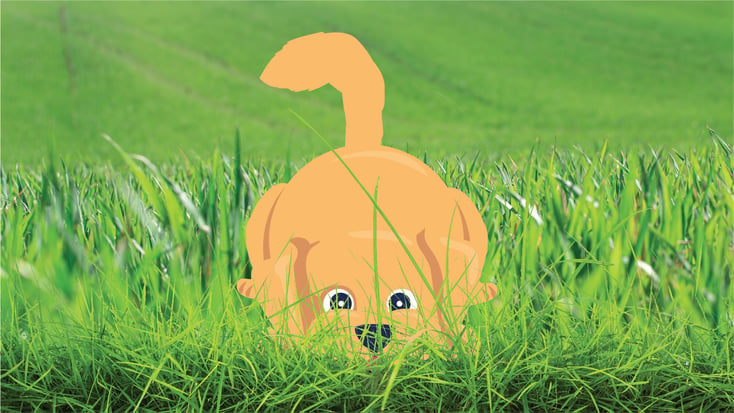Why Do Dogs Eat Grass? 6 Common Reasons

Table of Contents
If your dog is eating grass, you are probably a concerned pet parent wondering why it’s happening. It’s common to worry that a dog is feeling sick or has a nutritional deficiency if we spot them chewing on grass.
Why do dogs eat grass?
Eating grass is a very common and normal behavior for dogs; some dogs simply like the taste and texture of grass, and this strange behavior isn’t always linked to health problems or deficiencies.
Even though it's a common behavior for dogs, it can also be a sign they need to see a veterinarian.
However, there are lots of common reasons dogs eat grass:
1. Your dog is bored
Chewing and digging behaviors are commonly linked to boredom and a lack of mental stimulation.
Your dog might go into the garden to tear up your lawn if they want your attention, or is simply looking for something to do.
2. Your dog likes the taste of grass
Some dogs love the taste and texture of grass, especially in spring and summer when the grass is long and fresh.
Many dog owners report that their dog regularly eats grass, and it’s particularly common in younger dogs.
3. Your dog needs more fiber in their diet
Some dogs eat grass because they seek more fiber in their diet, as grass provides roughage. Some research suggests that dogs lacking sufficient fiber might turn to grass, which could be a drawback of grain-free diets with lower fiber content.
4. Your dog is feeling sick
It’s widely believed by pet parents that dogs eat grass because they feel sick or to try and make themselves sick.
However, research shows that less than 1 in 10 dogs showed signs of illness before eating grass. Only a quarter of dogs who ate grass were regularly sick afterward. So, while some dogs are sick after eating grass, it isn’t always the case.
Hassle-free In-Home Pet Sick Visits
When your pet isn't feeling well, the last thing you want is a stressful trip to the vet. Our in-home sick pet visits offer a calm, stress-free alternative.
5. Your dog is experiencing pain
Dogs often struggle to tell us they’re in pain and try to hide or distract themselves from it. A change in behavior, such as eating grass, could be a sign of either abdominal pain or pain somewhere else.
6. Your dog is trying to flush out parasites
To get rid of parasites – it’s thought by some researchers that undigested grass might help remove parasites from the gut by wrapping itself around the parasites so they are passed out of the digestive tract.
How to Stop Your Dog From Eating Grass
If your dog has a habit of eating grass, it's essential to address it, especially if it becomes excessive.
Here's a few simple steps to stop your dog from eating grass:
-
Increase Fiber Intake: Sometimes dogs eat grass to supplement their fiber needs. Consider a dog food with higher fiber content or add cooked vegetables to their diet.
-
Provide More Exercise: Dogs sometimes eat grass out of boredom. More walks and playtime can help alleviate this.
-
Mental Stimulation: Engage your dog with more toys and puzzle feeders to keep their mind occupied.
-
Regular Check-Ups: Ensure your dog is healthy and not eating grass due to an underlying issue by having regular vet visits.
-
Positive Reinforcement: Train your dog with commands like "leave it" and reward them for obeying to discourage the behavior.
-
Safe Chew Alternatives: Offer your dog safe chews or dental treats that can satisfy their need to munch on something.
-
Supervise Outdoor Time: Watch your dog closely when they are outside and distract them if they start to show interest in grass.
-
Treat for Parasites: Keep up with parasite prevention, as some dogs may eat grass to relieve stomach upset caused by worms.
-
Avoid Treated Lawns: Keep your dog away from lawns that may have been treated with chemicals.
-
Consult a Vet: If the behavior persists, seek advice from a veterinarian to rule out any medical reasons for the grass eating.
Concerned About Your Pet's Unusual Behavior?
Get peace of mind with expert counseling. Identify the reasons behind common behavior challenges and nurture a fulfilling bond with your beloved pet.
Conclusion
In conclusion, eating grass may be an occasional habit for some dogs, or it could mean your dog is unwell, in pain, or suffering from boredom or anxiety. But it can also become an obsessive and challenging behavior to deal with.
If you are concerned that your dog is suddenly eating much grass or showing signs of illness, it’s important to get them examined by their veterinarian.
You can also have your dog examined from the comfort of your own home. Book a vet visit, and we'll come to you!
Frequently Asked Questions
Is it okay for my dog to eat grass occasionally?
Yes, occasional grass eating is normal for dogs and usually isn't a cause for concern.
Why do dogs eat grass and then throw up?
Eating grass may ease their nausea, and it can also help induce vomiting in dogs if they feel sick.
Why do dogs eat grass when they’re sick?
Dogs may eat grass when they're feeling unwell as it can help induce vomiting, providing relief from nausea or discomfort. It's also thought that eating grass might help dogs remove parasites from their gut. However, not all grass-eating dogs are sick, as this behavior is common and can have various causes.
Can eating grass be harmful to my dog?
While grass itself isn't very nutritious, there's a risk of parasites. Keep up with regular parasite treatments, and be cautious of grass treated with pesticides or fertilizers, as they can be toxic.





